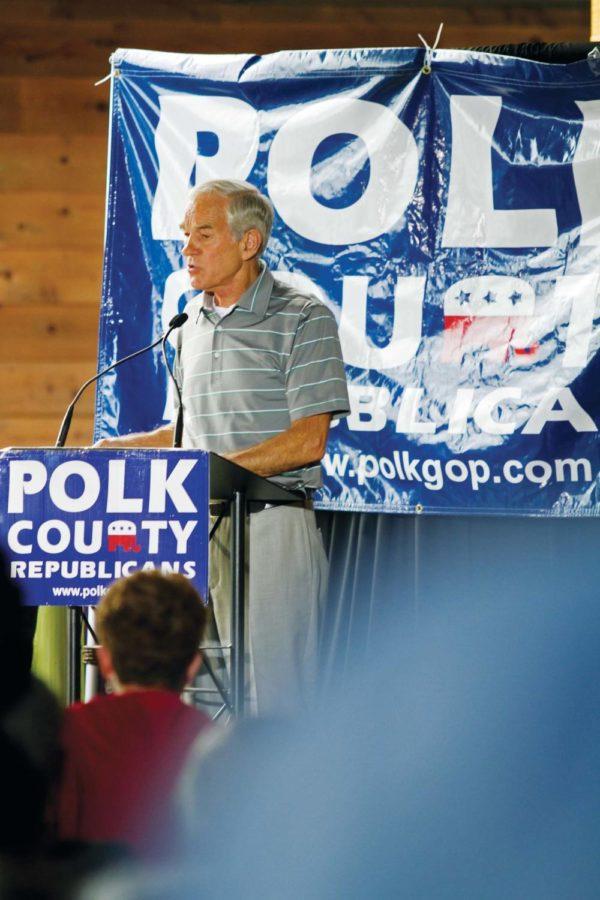Snell: Ron Paul on the economy, military spending and gay rights
Photo: Kelsey Kremer/Iowa State Daily
Republican representative and presidential candidate, Ron Paul speaks at the Polk County Republican Party Summer Picnic on Saturday, Aug. 27, at Jalapeno Pete’s on the Iowa State Fairgrounds in Des Moines. After shaking hands and meeting members of the crowd Paul shared his presidential intentions with the audience.
October 25, 2011
Note: On the night of Tuesday, Sept. 27, 2011, I had the privilege to ride with presidential candidate Ron Paul on his trip to the airport to fly home. For about 30 private and unscripted minutes, I had the 12-term congressman to myself. The results of that interview comprise more information than possible to convey in a single column, so the story has been broken into segments, of which this is the fourth.
Sitting there with Ron Paul, even in the dark as his driver took us to the airport for his return flight home, you could see the genuine worry on his face. Party ideology aside, it’s clear that this is a man who cares about his country. Dr. Paul is a free market economist of the Austrian school, so I asked him what specifically he believes the government has done to hurt the economy.
“Oh, a lot of things I think,” he replied candidly. “The Federal Reserve is one big part of the problem, and our unsound monetary system … We’ve messed with the interest rates and the inflation rates and tried to print money and spend our way out of problems before, and our business and productivity couldn’t keep up. Now we borrow all this money – we’re the biggest debtors in the world now – and we keep printing money and telling you everything’s okay. But it’s not okay. What happens when the bill comes due?”
The congressmen continued, “We’ve made this work so long, you know we got lucky, because the dollar was chosen as the reserve currency of the world. This gave us tremendous benefits, but now it’s not acceptable anymore to just print money and buy whatever we want.”
During the speech Dr. Paul gave in Nevada, he said individual citizens know how to handle this problem: They quit spending money, they don’t get another credit card, they get another job or they declare bankruptcy. If a country can’t declare bankruptcy, Congressman Paul said, “The result is much, much worse. Worse than anything imaginable … That’s when the violence starts. We’re already seeing it in other parts of the world.”
I asked Paul how we get ourselves out. He responded, “It’s a long process, and we can’t just do all these things and everything will suddenly be okay. But one thing, we’ve got to stop spending all this money on all these foreign wars.” In his speech earlier, the congressman said, “In my mind, there’s a difference between military spending and defense spending.”
He expounded in the car, “We can spend money on defense, that’s okay, but we just can’t afford all these hundreds upon hundreds of billions of dollars we’re spending on all these wars. Hundreds of military bases in over 100 countries … we need to bring our troops home and let them do their jobs here and spend all that money they’re making here.”
Since Iowa State has a thriving homosexual community, I asked how gays fit into Paul’s philosophy of freedom. The congressman cringed at the question and shook his head in frustration.
“You know I just, I don’t think of people in little groups like that. I don’t think of people as ‘gay’ here and ‘black people’ there, or ‘women’ over here…Everybody is an individual person and everybody has the same rights as anyone else. The government has no business in your private life, you know, so if one person is allowed to do something so should everyone else. The whole gay marriage issue is a private affair and the federal government has no say.”
With the recent death of “Don’t Ask, Don’t Tell,” I suggested to Congressman Paul that the issue isn’t likely to go away any time soon, and asked how he would address gays in the military as president.
“Well, like I said, everybody has the same rights as everybody else, so homosexuals in the military isn’t a problem. It’s only if they’re doing things they shouldn’t be, if they’re disruptive. But there’s … men and women getting into trouble with each other too. And there’s a lot more heterosexuals in the military, so logically they’re causing more trouble than gays. So yes, you just have the same rules for everybody and treat them all the same.” Paul voted for the repeal of “Don’t Ask, Don’t Tell.”
At this point in the interview we were nearing the airport. I suppose then it’s fitting that my series on my interview with Ron Paul is nearing its end too. I was originally slated for eight articles since the interview was so long and covered so many subjects. However, the next segment on Dr. Paul will be my last for now, but maybe I’ll do more later just to move the discussion again.







